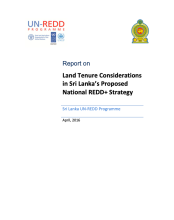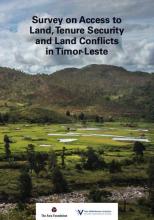/ library resources
Showing items 1 through 9 of 801.At the request of the Sri Lankan Government an assessment was designed and conducted as part of the development of the country’s national strategy on REDD+. The assessment involved applying criteria from the Voluntary Guidelines on the Responsible Governance of Tenure of Land, Fish
This study aimed to pilot an innovative land survey to provide quantitative data regarding landrelated issues in Timor-Leste, in order to support the Timorese government and parliament in developing evidence-based land policies and legislation, as well as more informed advocacy of civil society.
In this article the author has aimed a study on F.A.O. regarding historical aspects of formation F.A.O. as a specialized agency of the UN, analysis directions of its activity, its main functions etc. The author also aims to examine specific issues related to cooperation between F.A.O.
The present research focuses on estimating forest area change with respect to the ongoing forest land conversion.
European agri-environmental schemes are being criticised for reinforcing rather than negating an opposition between agricultural production and environmental production, and for assuming instead of securing a public willingness to pay for agri-environmental change.
In recent years, numerous articles have addressed management strategies aimed at assisting forests to adapt to climate change. However, these seldom take into account the practical and economic implications of implementing these strategies, notably, supply of forest plants and seed.
This article explores the role of local particularism in relation to the global interest in urban agriculture (UA). A growing movement is advocating UA, but future prospects are limited by variability, unclear expectations, vague responsibilities and leadership in the UA movement.
Conservation is a fundamentally spatial pursuit. Human–elephant conflict (HEC), in particular crop-raiding, is a significant and complex conservation problem wherever elephants and people occupy the same space.
One of the main causes of tropical forest loss is conversion to agriculture, which is constantly increasing as a dominant land cover in the tropics. The loss of forests greatly affects biodiversity and ecosystem services.
Paginación
Land Library Search
Through our robust search engine, you can search for any item of the over 73,000 highly curated resources in the Land Library.
If you would like to find an overview of what is possible, feel free to peruse the Search Guide.




